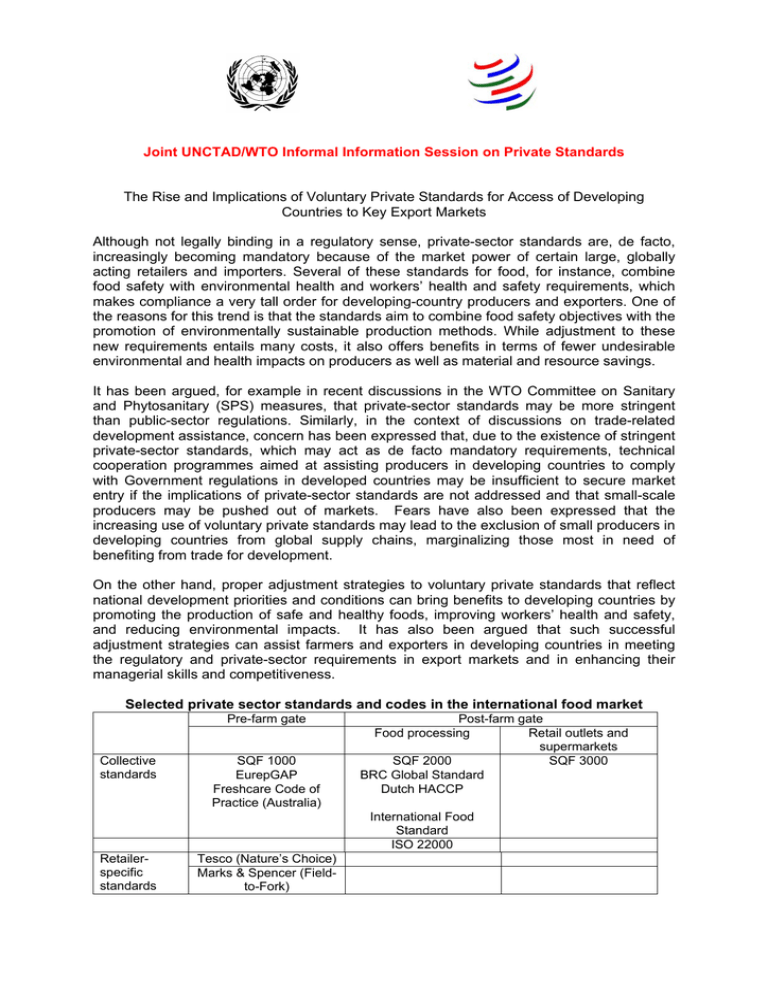Joint UNCTAD/WTO Informal Information Session on Private Standards
advertisement

Joint UNCTAD/WTO Informal Information Session on Private Standards The Rise and Implications of Voluntary Private Standards for Access of Developing Countries to Key Export Markets Although not legally binding in a regulatory sense, private-sector standards are, de facto, increasingly becoming mandatory because of the market power of certain large, globally acting retailers and importers. Several of these standards for food, for instance, combine food safety with environmental health and workers’ health and safety requirements, which makes compliance a very tall order for developing-country producers and exporters. One of the reasons for this trend is that the standards aim to combine food safety objectives with the promotion of environmentally sustainable production methods. While adjustment to these new requirements entails many costs, it also offers benefits in terms of fewer undesirable environmental and health impacts on producers as well as material and resource savings. It has been argued, for example in recent discussions in the WTO Committee on Sanitary and Phytosanitary (SPS) measures, that private-sector standards may be more stringent than public-sector regulations. Similarly, in the context of discussions on trade-related development assistance, concern has been expressed that, due to the existence of stringent private-sector standards, which may act as de facto mandatory requirements, technical cooperation programmes aimed at assisting producers in developing countries to comply with Government regulations in developed countries may be insufficient to secure market entry if the implications of private-sector standards are not addressed and that small-scale producers may be pushed out of markets. Fears have also been expressed that the increasing use of voluntary private standards may lead to the exclusion of small producers in developing countries from global supply chains, marginalizing those most in need of benefiting from trade for development. On the other hand, proper adjustment strategies to voluntary private standards that reflect national development priorities and conditions can bring benefits to developing countries by promoting the production of safe and healthy foods, improving workers’ health and safety, and reducing environmental impacts. It has also been argued that such successful adjustment strategies can assist farmers and exporters in developing countries in meeting the regulatory and private-sector requirements in export markets and in enhancing their managerial skills and competitiveness. Selected private sector standards and codes in the international food market Pre-farm gate Collective standards SQF 1000 EurepGAP Freshcare Code of Practice (Australia) Post-farm gate Food processing Retail outlets and supermarkets SQF 2000 SQF 3000 BRC Global Standard Dutch HACCP International Food Standard ISO 22000 Retailerspecific standards Tesco (Nature’s Choice) Marks & Spencer (Fieldto-Fork) Auchan (Filière Agriculture Raisonnée) Carrefour (Filière Qualité) An increasing number of developing countries are attempting to better understand the role and implications of private-sector standards for access to export markets, and are suggesting a more systematic discussion of this subject in the Committee on the Application of Sanitary and Phytosanitary Measures (SPS Committee) of the World Trade Organization (WTO) and in the context of UNCTAD's Consultative Task Force (CTF) on Environmental Requirements and Market Access for Developing Countries. However, there is a glaring paucity of empirical studies on (i) the developmental implications of voluntary private-sector requirements in exporting developing countries; (ii) the impact of private standards on access to export and local markets; and (iii) the treatment of such voluntary standards under WTO disciplines. UNCTAD's CTF, in close collaboration with the UN Food and Agricultural Organization has prepared a series of a dozen of country-case studies on the developmental and market access implications of the private EurepGAP standard for fresh fruit and vegetables in Africa (including Ghana, Kenya, Uganda); Asia (for Malaysia, Philippines, Thailand, and Viet Nam), and South and Central America (focusing on Argentina, Brazil, Chile, and Costa Rica). The key findings of these studies have been synthesized in four books that are currently in print. Their manuscripts will soon be available on the Trade, Environment and Development website of UNCTAD at www.unctad.org/trade_env Some of the authors of the country-case studies will be among the resource persons invited to address the UNCTAD-WTO Informal Information Session.

